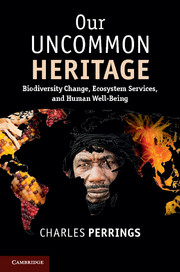Part I - Diagnosing the biodiversity change problem
Published online by Cambridge University Press: 05 June 2014
Summary
Diagnosing the biodiversity change problem
Everyone in the world depends completely on earth’s ecosystems and the services they provide, such as food, water, disease management, climate regulation, spiritual fulfillment, and aesthetic enjoyment. Over the past fifty years, humans have changed these ecosystems more rapidly and extensively than in any comparable period of time in human history, largely to meet rapidly growing demands for food, freshwater, timber, fiber, and fuel. This transformation of the planet has contributed to substantial net gains in human wellbeing and economic development. But not all regions and groups of people have benefitted from this process – in fact, many have been harmed. Moreover, the full costs associated with these gains are only now becoming apparent (Millennium Ecosystem Assessment 2005c).
- Type
- Chapter
- Information
- Our Uncommon HeritageBiodiversity Change, Ecosystem Services, and Human Wellbeing, pp. 37 - 38Publisher: Cambridge University PressPrint publication year: 2014



